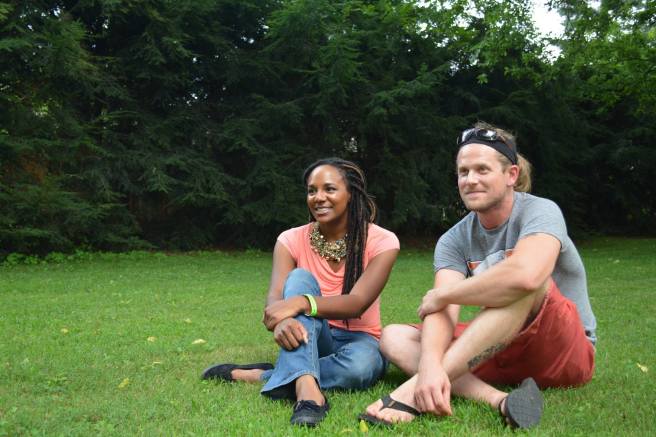I realize this is a little premature, but this feels a little like a “What Did I Do Over Summer Vacation” essay that I had to write in fifth grade. Mrs. Henson was a stickler for good penmanship and right manners. Old school. She was decidedly old school. But I digress.
This summer I had the distinct privilege of being asked to serve as the Liturgical Coordinator for the Wild Goose Festival held in Hot Springs, NC. The festival is a time and place of celebrating the “intersection of Spirit, Justice, Music, and the Arts” that began a few years ago. As such liturgies abound. Some of them were rather traditional. The Episcopal tent, for example, held Compline services every night. They also broke out of the mold and hosted a songwriter circle and an agape feast. The Goose is like that. Ask the Methodists about the beer tent. Oh, and the Baptists had a coffee shop.
People break from the mold a little. There was a eucharistic liturgy where a blacksmith literally hammered a rifle into a farm implement. It was an unusual eucharist, to be sure, but beautiful.

This summer’s theme was “Blessed Are The Peacemakers.” Preachers like Dr. William Barber were there to inspire us. Rev. Traci Blackmon from Ferguson, Missouri was also there. She preached at our closing Eucharist. Rev. Joy Wallis was our celebrant.
Others were there like Brian McLaren and Tony Campolo. There were three or four different sessions going on simultaneously each of the three days. Ana Hernandez was there to help out with music. She says hello to everyone.

Right, the music. One of the ways to understand Wild Goose is to imagine Burning Man and then mashing it up with Greenbelt or the Chautauqua Institute. Musicians from various stripes were there to perform. Gungor, Matt Morris, Yara Allen, Emmanuel Jal, The Collection, The Brilliance, and many others. No one genre was featured. No one style. There were pop-up concerts all over the place. Jam sessions and impromptu meet-ups happened all the time.
As the Liturgical Coordinator, it was my responsibility to make sure that the scheduled liturgies and their organizers had all they needed. I tried to have my title changed to Liturgical Enabler because that’s what I was actually doing. Everyone there had a liturgical habit they needed met. I was happy to help out. From free church to high church and everything in between and beyond, I counted over 45 liturgies (officially sanctioned or otherwise) during the festival.

This was the first year they asked for someone to serve in the position. I was not the first person they asked. I’m really glad that the first person turned it down. It was incredible.
What all these liturgists needed was a sense of common vision, a way to articulate a liturgical posture or narrative for the weekend. So, to close this little missive for you all, I’m going to share what I offered during our opening ceremony. I wanted to show people what I was already seeing and to invite them into a community, a social space, a geographical place where everything old was new again.
What is going on here?
You have stepped through the veil
into a temple without walls jet-lagged,
road weary, burned out, intrigued, hopeful,
enthusiastic, and just a little confused.You have entered a basilica
where the dome of heaven itself is the ceiling.
Shrines and altars line the route on our pilgrimage together;
a holy time;
a thin place crafted by your hands
and kissed by the Holy Spirit.
She is inviting you to join in
The rhythms of our time together.Blessed are the peacemakers.
This is the three great days of Holy Week,
a continuous liturgy that begins on Thursday night
and concludes on Sunday morning.Blessed are the peacemakers.
This is a tent revival
where we will testify to the movement of The Divine
in our streets, classrooms, courthouses, homes,
and even our churches urging one another
to wake up to the truth that the holy is in each of us.Blessed are the peacemakers.
This is a festival of art and music where we are reminded
that we are bodies-good creatures-blessed icons of heaven on earth
and we can move and sing and be engulfed
in landscapes and soundscapes of hope.Blessed are the peacemakers.
Blessed are you, the peacemakers.
Blessed are we, the peacemakers.This is the liturgy of Wild Goose. Welcome.
It was an honor to have the opportunity to play with 2,200 people who gathered there on the banks of the French Broad River. I hope to do it again.
Rev. Tripp Hudgins is Director of Admissions at American Baptist Seminary of the West and a PhD student in Liturgy and Ethnomusicology at Graduate Theological Union.




